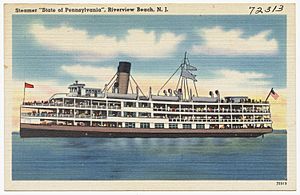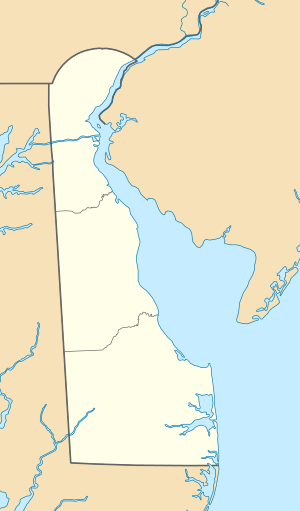State of Pennsylvania (steamboat) facts for kids
class="infobox " style="float: right; clear: right; width: 315px; border-spacing: 2px; text-align: left; font-size: 90%;"
| colspan="2" style="text-align: center; font-size: 90%; line-height: 1.5em;" | 
|- | Designer: | George G. Sharp
|} The State of Pennsylvania was a cool steamboat built in Wilmington, Delaware in 1923. It had an identical sister ship called State of Delaware. This steamboat sailed on the Delaware River. It traveled between its homeport of Wilmington and cities like Chester and Philadelphia in Pennsylvania. It also went to Riverview Park in Pennsville, New Jersey. Regular trips on these routes stopped in 1960. The boat later sank near its dock in the Christina River in 1970. In 1979, it was added to the National Register of Historic Places. Sadly, in 1988, its upper decks were destroyed by a fire. In 2005, the hull was removed and scrapped because it was a danger to boats.
Contents
| History | |
|---|---|
| Name | State of Pennsylvania |
| Namesake | U.S. state of Pennsylvania |
| Owner | Wilson Line |
| Builder | Pusey and Jones |
| Completed | 1923 |
| Homeport | Wilmington, Delaware |
| Fate |
|
| General characteristics | |
| Type | Streamlined steamboat |
| Length |
|
| Beam | 48.9 ft (14.9 m) |
| Draft | 10.5 ft (3.2 m) |
| Decks | 4 |
| Installed power | 2,900 hp (2,200 kW) triple expansion steam engine |
| Speed | 18 mph (29 km/h; 16 kn) |
| Capacity |
|
|
State of Pennsylvania (steamboat)
|
|
| Location | Christina River, Wilmington, Delaware |
| NRHP reference No. | 79000637 |
| Added to NRHP | 20 April 1979 |
What Made Her Special?
The State of Pennsylvania and State of Delaware were very impressive. They were known as the "most powerful" and "widest and tallest" single-propeller riverboats on the East Coast. Each ship was about 219 feet long. Their total length was 226 feet. They had four decks for passengers. About 80% of each ship was made of steel. This helped to protect them from fires. The boats needed 10.5 feet of water to float.
In 1944, the State of Pennsylvania was made longer. It grew by 10 feet to a total length of 236 feet. This was done by adding a special "raked bow" at the front. Both ships had a powerful 2900 horsepower steam engine. This engine allowed them to travel at a speed of 18 miles per hour. The State of Pennsylvania was also the first riverboat to have a "whistle-light assembly." This cool system made two lights flash when the whistle blew.
Exploring the Decks
The lowest part of the ship, the hull, held the engine room. It also had fuel tanks, the crew's dining area, and their sleeping quarters. The first deck, called the Main deck, had the purser's office. This is where tickets and money were handled. There were also storage lockers, a soda fountain, and places for passengers to relax.
The second deck, known as the Saloon deck, was a fun place. It had a large ballroom and a stage for a band. There was also an open area where people could enjoy the views. The third and fourth decks were observation decks. They were built with two raised steps. This allowed passengers in the middle to see over those closer to the railings. The very top deck also held the pilot house. This is where the captain steered the ship. Officer's rooms, life rafts, and six lifeboats were also on this deck.
A Look Back: Her Journey
The State of Pennsylvania and its sister ship were designed by George G. Sharp. They were built by the Pusey & Jones Corporation in 1923. This happened on the Christina River. Joseph S. Wilson ordered the State of Pennsylvania to be built. He owned the Wilson Line. His father, Captain Horace Wilson, and he were both mayors of Wilmington.
Years of Fun and Travel
From 1923 to 1960, the ship was very busy. It carried and entertained about 20 to 25 million passengers. In the 1930s, movie screens and projectors were added to the top deck. The State of Pennsylvania and State of Delaware were the first steamboats to show movies. They were also the first to broadcast live radio shows. The ship's ballroom was decorated in the Art Deco style by John Wanamaker. It was a very popular spot. The song Pennsylvania Polka became the ship's unofficial theme song.
On June 27, 1938, a special event happened. It was the 300th anniversary of Swedish and Finnish settlers arriving in America. President Franklin D. Roosevelt and Swedish Crown Prince Gustaf Adolf and the Crown Princess were there. They watched the State of Pennsylvania arrive in Wilmington with its important guests.
Later Years and Retirement
The ship mostly sailed on summer trips on the Delaware River and Delaware Bay. During World War II, it helped by transporting shipyard workers in Baltimore. In 1948, it started a new route for the Wilson Line to New York. In the 1950s, it sailed out of Philadelphia on educational trips. It was even called a "Little Red Floating School House."
In the 1950s, City Investing Corporation bought the Wilson Line. They stopped the trips from Philadelphia to Chester, Wilmington, and Riverview Park in September 1960. This marked the end of the State of Pennsylvania's time as a working ship.
Images for kids
-
Postcard depicting Wilson Line boats on the Christina River. The State of Pennsylvania or her identical sister ship State of Delaware on the right
 | James Van Der Zee |
 | Alma Thomas |
 | Ellis Wilson |
 | Margaret Taylor-Burroughs |



